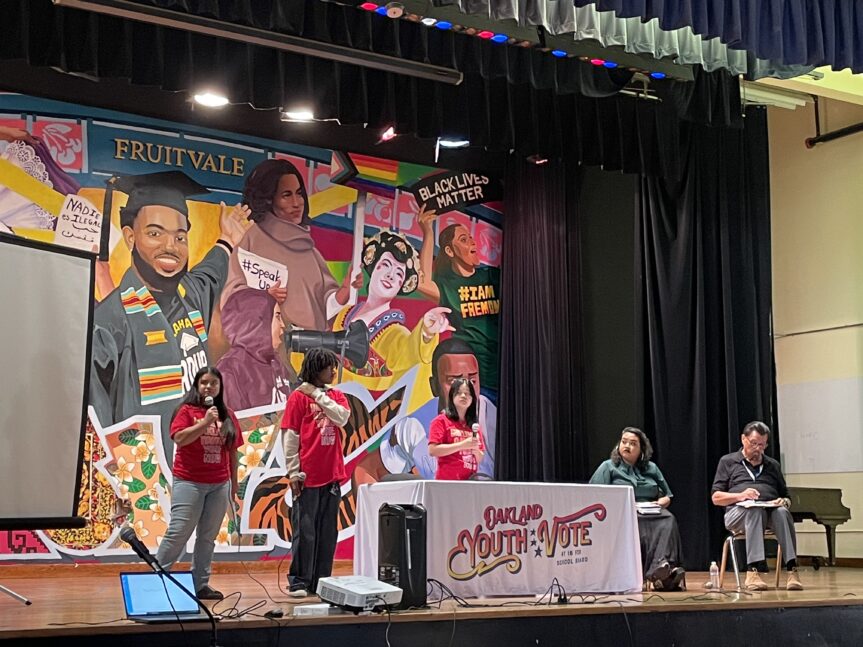This article is part of Great School Voices Oakland election coverage. Check back later this week for video interviews with student-submitted questions for both District 5 school board candidates.
Oakland youth are still waiting to be able to vote but that has not prevented them from getting involved in school board elections. Measure QQ, approved by over ⅔ of voters in 2020, allows 16-and-17-year-olds to vote in school board elections but it has yet to be implemented. Don’t confuse waiting with inaction, though: Oakland students are standing up to make their voices heard in the 2023 Oakland school board election.
An off-year, mail-in-ballot election (there is just one place in the district to drop off ballots) will fly under-the-radar to many voters. As ballots started arriving in District 5 voters’ mailboxes in mid-October, students from the Oakland Youth Commission helped raise awareness of the election and of the two candidates’ views at a candidate forum it hosted at Fremont High School.
The forum was designed by students, who also came up with the questions Candidates were given a minute and a half to answer each question. At the end of the forum, mock ballots were distributed to the audience. The results will be unveiled at an upcoming board meeting according to the youth commission.
In his opening statement, Lerma highlighted his 34 years experience working in schools as a teacher and administrator, a role he currently continues as an OUSD substitute principal. Ritzie-Hernandez spoke of growing up an English Language Learner student and how she was shaped by that experience.
Here’s some quotes we pulled from the candidates’ answers to the students’ questions.
Centering student voice on the school board
Ritzie-Hernandez: “I believe, first and foremost, that the allyship is going to be the way to go. And that has to be defined by students.”
Lerma: “I’m looking forward to having direct contact with (students) and developing the leadership in students, supporting students’ voice by developing constant contact, not an occasional survey.”
School lunch
Lerma: “We need to totally redefine the food service and the food quality and get the students involved.”
Ritzie-Hernandez: “That comes from us working together to ensure that we can have quality food because we have the money. It’s there. The food is not what we deserve.”
Student mental health
Ritzie-Hernandez: “Our budget and our contracts should reflect our priorities. And our priorities should be the mental health of our students and the overall health of our students.”
Lerma: One of the key things, there’s a lot of stress around grades and achievement and passing the course. If we could get every student to pass their subject matter, that alone would relieve half the attention and half the anxiety that (they) feel.”
Safety
Lerma: “Parents need to be involved, community needs to be involved. It’s not an issue of more cops, more guns, more of that, we know we’re getting away from those approaches.”
Ritzie-Hernandez: “I’m not interested in recreating prisons in our schools because one thing we know is that when schools look like prisons we further invest in the racist school-to-prison pipeline.”
School closures
Ritzie-Hernandez: “Before we even consider closing our schools, one of the things that we need to really create is an impact analysis. How is this affecting us?”
Lerma: “I’m more interested in the real estate in our children’s and our students minds than the physical brick and mortar. If we have to repurpose some of our property, I’m willing to look at that.”
Homeless students
Lerma: “It’s important to be looking at the resources that we have, doing our part as a school district, but the main thing is to partner with the city, with the county, and the state to resolve this issue.”
Ritzie-Hernandez: “For us, a district with the amount of money that we have, and that’s willing to spend $2 million dollars on a special election, I’m pretty sure that we can find the money to ensure every one of our students has a home.”
Restorative Justice
Ritzie-Hernandez: “We definitely want to ensure that our budget is reflective of our priorities and our priorities should be are students, ensuring their safety. We’re not just talking about the physical and emotional, but the mental and the overall student (health).”
Lerma: “I believe Restorative Justice is an important first step. But I will say this, that students behavior and outcomes won’t change until adult behaviors change. Right now we have a school board, and administrators who can’t talk to each other, who have different beliefs, who can’t get together to solve the issues that we have in the Oakland Unified School District.”

